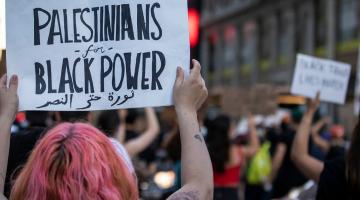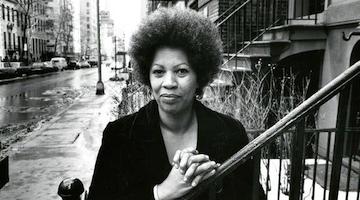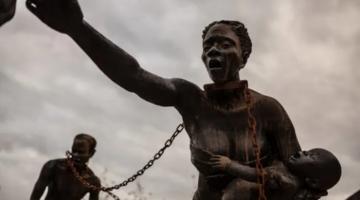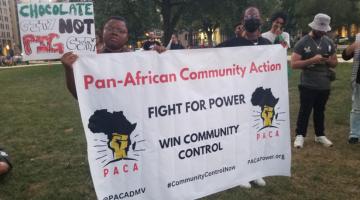The law is a shaky foundation to rest on, particularly for Black people and other marginalized communities.
“An assumption that the courts will deliver ‘justice” regularly ignores the fact that Black people have never known such a thing.”
Throughout the history of Black America, progress has often required breaking the law. For this reason, it’s worth questioning why, in sanitized mainstream narratives (for example, those shared in schools and government functions during Black History Month), the story of Black struggle is often divorced from incendiary, illegal acts. Most Black people in the United States are descended from enslaved Africans, and being Black in this country has never been wholly separated from that history. In fact, it still haunts us daily as we navigate its afterlife. This is a legacy that was demarcated by restrictions that continually pierced the everyday experience of living. For many Black people during the time of slavery, to be free was illegal itself — and in many ways, that reality has extended into every era following “emancipation.” Since then, the necessity of extralegal acts has continued for a people still constantly being ensnared by a society stacked against them.
“For many Black people during the time of slavery, to be free was illegal itself.”
Of course, Black people have often used U.S. law as a tool to make gains which often extended to many others. Activists have sued and otherwise challenged institutions in court throughout history, to great effect. For example, thanks to the legal battles of the N.A.A.C.P., Black people saw significant gains on this front in cases like Brown v. Board of Education and Guinn v. United States. Landmark legislation has resulted in significant changes for Black Americans, thanks to the efforts of organizers. For instance, the victorious Brown v. Board of Education ruling laid important foundations for the civil rights movement that encouraged other organizing leading up to the passage of legislation like the Civil Rights Act of 1964 and the Fair Housing Act. Yet, racism is encoded in laws that criminalize poverty and other conditions Black people disproportionately experience. In a sense, that much remains like it always has been. The law is a shaky foundation to rest on, particularly for Black people and other marginalized communities.
However, we’re now in a historical moment when the racist and anti-Black president is, understandably, condemned as an affront to legality. Donald Trump’s first term saw the most lawsuits against a presidential administration in decades. “We’ll see you in court” has become a catchy utterance for organizations challenging Trump’s egregious attacks on the environment, immigration, civil and human rights. Witnessing the mockery of an impeachment trial during this presidency has exposed yet again that the law is unevenly applied, and that those with power are often able to break the law at will with no consequences. The law bends, twists and moves itself for many reasons.
“Racism is encoded in laws that criminalize poverty.”
As such, we’ve seen victorious attacks on landmark legislation like the Voting Rights Act and a slew of other rollbacks over the past several years. These regressive legal developments should remind us that white supremacy is a constant within the legal institutions of the nation. That which is blatantly discriminatory has to go to court and be argued against because in the United States, it’s fair game to argue in court that those who are oppressed deserve their oppression.
The denial of pain and violence experienced by the oppressed is part of the dominant white supremacist culture. Were it not, we would never have had to go to court in the first place to plead for our human rights. The establishment has gradually eased the tensions of an ever-changing society so contentious issues didn’t turn into uncontrollable uprisings many times before. This is often the purpose of reform — to stave off revolution, to uphold the current legal system. An assumption that the courts will deliver “justice” — simply by upholding the law — regularly ignores the fact that Black people have never known such a thing, because our historic victories are perpetually under attack.
“White supremacy is a constant within the legal institutions of the nation.”
In fact, consider that the Constitution of the United States, often viewed as the ultimate basis for meting out justice, is a racist document in its origins. The European Enlightenment values embedded in the Constitution did not extend to Black people at its inception and still struggle to do so completely now. The Constitution is embraced in a bipartisan fashion and used for whatever means either side hopes to gain from it. Like interpretations of a holy text in a religion, the definite meanings of these laws and prescriptions are continually up for debate based on who is interpreting them and what side they’re on. This debate goes on ad nauseum, and is increasingly disillusioning for a populace weary of slow gains via trickle-down legal changes.
As per this country’s first laws, Black people were not meant to be citizens and our continued disenfranchisementis a constant reminder. From the fugitive resistance to slavery to the civil rights sit-ins against Jim Crow and the armed self-defense of the Black Power movement, many of our causes have involved battling institutions — not uprooting illegality, but uprooting injustices embedded within the law itself. What Black people have had to do in order to confront those injustices has often been illegal, from defending against police brutality to stealing food to occupying living spaces. Many have died along the way, because the white supremacist institutions leave us with no choice but utter defiance.
“Many of our causes have involved battling institutions — not uprooting illegality, but uprooting injustices embedded within the law itself.”
Thus, we should be warned by history not to overemphasize legality — or condemn all “lawlessness” — in our arguments for justice and our work in fighting oppression. To be clear, if a cop can kill you because they feel like it and you always “fit the description” of their target, you are not protected by the law. Why invest ourselves in protecting what does not protect us?
The history of Black resistance has always meant breaking the law, because unjust laws do not deserve our respect or obedience. Knowing that our enslavement, deprivation and segregation were all legal should inform our current choices about when and how to engage with the law. In order to achieve what’s been gained, laws have had to be broken and they will continue to need to be broken. We have had to be intolerant of the systems that oppress us and strive for a new reality — a reality in which oppressive systems are abolished.
As we reflect during this Black History Month, never forget we have always had to rebel, revolt and rise up against the law itself — not simply rely on it.
William C. Anderson is a freelance writer. His work has been published by the Guardian, Truthout, MTV and Pitchfork, among others. He’s co-author of As Black as Resistance (AK Press 2018).
This article previously appeared in Truthout.
COMMENTS?
Please join the conversation on Black Agenda Report's Facebook page at http://facebook.com/blackagendareport
Or, you can comment by emailing us at comments@blackagendareport.com



















